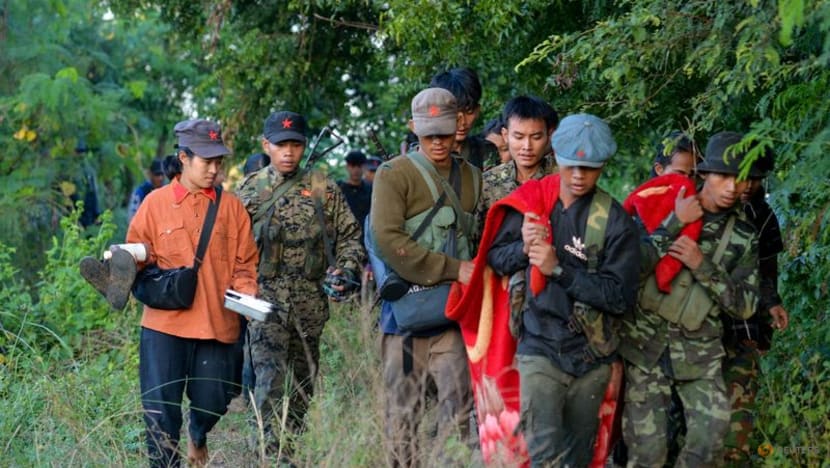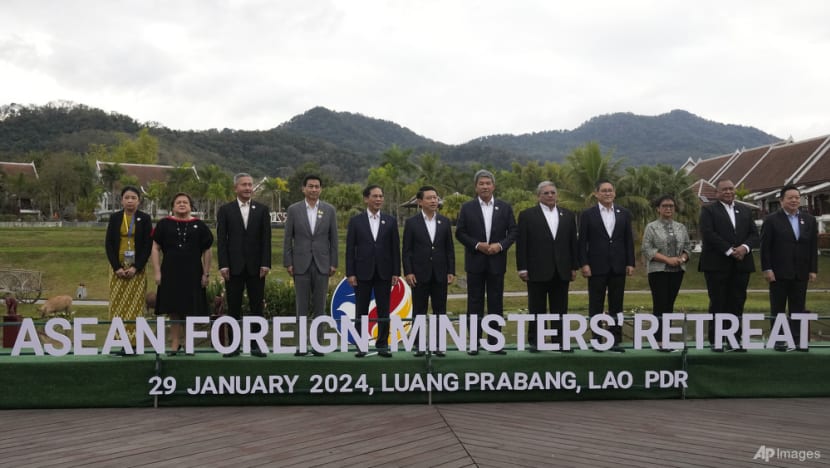‘Disaster on top of a disaster’: Weakening Myanmar junta using weapons on innocent civilians, says UN envoy
While the weakening of the junta is good news in the long term, the junta’s response of turning on the people of Myanmar is a “very significant problem”, said Mr Tom Andrews.

FILE PHOTO: People's Liberation Army PLA members, carry an injured person as they fight the Myanmar junta army near Sagaing Region in Myanmar November 23, 2023. REUTERS/Stringer/File Photo

This audio is generated by an AI tool.
Myanmar’s military junta has been getting weaker for months, but that has spelt more problems for the country’s people in the short term, United Nations rights envoy Tom Andrews said on Monday (Jan 29).
Since October, the junta has lost over 4,000 soldiers who have either surrendered or defected, and the military has also been losing ground in territory, he noted.
“They've lost military outposts and weapons, including significant artillery, so they're losing ground. The problem (is) as they do so, they have been responding by attacking villages,” he said, adding that they have very sophisticated powerful weapons of war to do so with.
While the weakening of the junta is good news in the long term, the junta’s response of turning on the people of Myanmar is a “very significant problem”, he said.
“It's a disaster on top of a disaster,” the UN special rapporteur on human rights in Myanmar told CNA’s Asia First.
Since the coup nearly three years ago, 2.3 million people have been displaced and 18.6 million people are in dire need of humanitarian aid, said Mr Andrews, who is also a Robina senior human rights fellow at Yale University Law School.
Last year, over 10,000 Myanmar children died due to what the UN describes as acute and severe malnutrition.
“Myanmar kids are literally starving to death. More than half the country has fallen into poverty. This country of Myanmar is suffering incredibly ever since the coup occurred nearly three years ago,” said Mr Andrews.
MYANMAR AND ASEAN
When asked about military-ruled Myanmar sending a bureaucrat to the Association of Southeast Nations (ASEAN) foreign ministers’ meeting on Monday, Mr Andrews said that the fundamental problem is that “you simply can't trust the military junta and any agreement that they sign”.
“As soon as the junta agrees to anything, it quickly just changes its tune. It agrees to one thing on one day and completely does the opposite the next day,” he said, pointing to how the junta attacked innocent civilians soon after agreeing to a peace plan that required it to cease violence.
Myanmar's ruling generals remain barred from key ASEAN meetings over their prolonged failure to implement the five-point consensus, the peace plan agreed between the junta and the regional group two months after the 2021 coup.
ASEAN has a policy of inviting Myanmar to send what it calls a "non-political" representative instead, but the junta has in the past two years declined. This year, Myanmar sent Ms Marlar Than Htaik, permanent secretary of the Foreign Ministry under the control of the junta, to represent the country in Luang Prabang.
CNA Correspondent: Is Myanmar's resistance movement making strides?

ELECTIONS ON THE CARDS?
The state of emergency in Myanmar is set to expire on Wednesday, following a six-month extension in July last year.
When asked if there would be another extension, Mr Andrews said that extending it further would allow the military junta to avoid having elections, which it had initially promised to hold in August 2023.
However, there “simply cannot be and will not be anything resembling a free and fair election in Myanmar” under the current horrific conditions which include attacks on civilians, he said.
Politically, it is also not possible, considering that there are more than 20,000 people detained because they oppose the junta, said Mr Andrews.
“You cannot possibly have an election when you have these kinds of social and political conditions, and you certainly can't have an election when the junta is systematically attacking the people of Myanmar,” he said, citing a military analyst who said that 95 per cent the junta’s military operations are being trained against the people of Myanmar.
He added that whenever an extension is declared by the junta, they say it is to establish stability and security.
“Just precisely the opposite occurs. So, from the point of view of the people of Myanmar, I don't think it matters to them what the contract says or declares with respect to a state of emergency, I think that they expect things are just going to continue to deteriorate for the country and for most of them,” he said.
FUTURE OF MYANMAR
Mr Andrews said that Myanmar's junta leader Min Aung Hlaing’s goal is to stay in power and for that, he needs legitimacy, money and weapons. He noted that the number one source of weapons for the junta is Russia.
Other countries are, however, increasingly cutting off the supply of weapons and money to the junta, he said.
Mr Andrews, who is currently conducting research for an upcoming report, said that documents show that the junta is losing ground even more when it comes to accessing weapons, and the money that it needs to buy those weapons.
“There is progress that is being made, but the key is for the international community to stand together, coordinate its efforts and work to weaken the military junta, so that it can no longer continue its reign of terror and devastation on the people of Myanmar. That is, I think, the critical link,” he said.
“The people of Myanmar have been doing an incredible job in working for justice and human rights and for a future for their country, but they need the international community to stand with them. And the best way we can do that is to try to stop the flow of weapons and resources that the junta needs to sustain itself.”















